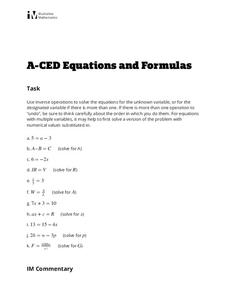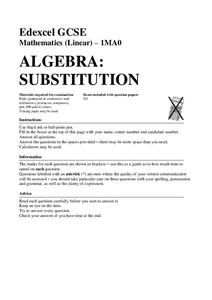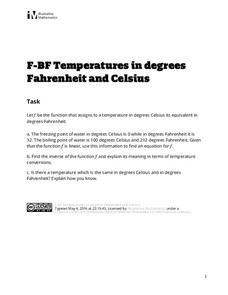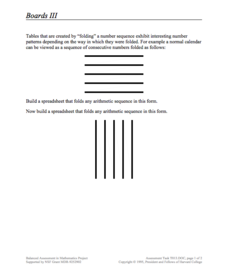Illustrative Mathematics
Equations and Formulas
Your class is asked to use inverse operations to solve eleven equations for unknown variables or to rearrange formulas to highlight a quantity of interest. By using the same reasoning as solving one- and two-step equations, algebra...
Mathed Up!
Algebra: Substitution
The sixteen problems in this resource present opportunities for pupils to practice substituting into algebraic expressions. Scholars evaluate algebraic expressions for given values of the variables. In a few cases, class members need to...
EngageNY
Addition and Subtraction Formulas 1
Show budding mathematicans how to find the sine of pi over 12. The third instructional activity in a series of 16 introduces the addition and subtraction formulas for trigonometric functions. Class members derive the formulas using...
EngageNY
An Area Formula for Triangles
Use a triangle area formula that works when the height is unknown. The eighth installment in a 16-part series on trigonometry revisits the trigonometric triangle area formula that previously was shown to work with the acute triangles....
Del Mar College
Algebra Assessment Review
Jam packed with problems, this advanced Algebra instructional activity focuses on topics such as domain, solving quadratics, solving rationals, and function notation.
Concord Consortium
Square-Ness
Are there some rectangles that are more square than others? A thought-provoking task asks individuals to create a formula that objectifies the square-ness of a set of rectangles. They then use their formulas to rank a set of...
CCSS Math Activities
Smarter Balanced Sample Items: 6th Grade Math – Target E
When US citizens travel throughout the world, they often need to know how to convert temperatures from Fahrenheit to Celsius. Young mathematicians practice applying the formula as well as other algebraic equations as part of a...
Balanced Assessment
Bumpy-Ness
Develop a new measure of the properties of an object. Scholars develop a definition and formula to measure the bumpy-ness of an object. They utilize their formulas to find the property for several spherical objects.
Illustrative Mathematics
The Physics Professor
Help mathematicians see that a formula found in a physics book has an algebraic structure. Though the formula given in the resource looks complicated, learners are to break down the expressions and interpret each part separately. Young...
Curated OER
A Sum of Functions
Collaborative learners will see the geometric addition of functions by graphing the sum of two graphed curves on the same coordinate plane. This task then naturally flows into giving learners the algebraic representation of the curves...
Illustrative Mathematics
Slopes and Circles
An upper-level treatment of what is often presented as a basic concept (the right angle of an inscribed circle on the diameter), this activity really elevates the mathematical thought of the learner! Expected to develop formulas...
Inside Mathematics
Expressions
Strive to think outside of the quadrilateral parallelogram. Worksheet includes two problems applying prior knowledge of area and perimeter to parallelograms and trapezoids. The focus is on finding and utilizing the proper formula and...
EngageNY
Mid-Module Assessment Task - Algebra 1 (Module 3)
Having trouble finding performance task questions? Here is an assessment that uses all high-level thinking questions. It includes questions to assess sequences, linear functions, exponential functions, and increasing/decreasing intervals.
EngageNY
Replacing Letters with Numbers
When did letters become the same as numbers? Scholars learn about substituting numbers for letters to evaluate algebraic expressions in the seventh part in a series of 36. The lesson focuses on expressions related to geometry, such as...
Balanced Assessment
Sharp-Ness
Transform pupils into mathematicians as they create their own definitions and formulas. Scholars examine an assortment of triangles and create a definition and formula for determining the sharpness of the vertex angle. The groups of...
EngageNY
Mid-Module Assessment Task - Algebra 2 (Module 1)
Challenge classes to think deeply and apply their understanding of polynomials. The assessment prompts learners to use polynomial functions to model different situations and use them to make predictions and conclusions.
PBS
Working with Coordinate Planes: Assessments
It's time for scholars to show what they know about coordinate planes with a collection of three assessments. The exams' objectives include plotting points on a single grid, measuring using the distance formula, and identifying...
Balanced Assessment
Frosting on the Cake
Party planners need algebra too! Here, pupils decide the perfect size of a cake based on available ingredients. They use the concepts of area and perimeter to make their conclusions.
Inside Mathematics
Conference Tables
Pupils analyze a pattern of conference tables to determine the number of tables needed and the number of people that can be seated for a given size. Individuals develop general formulas for the two growing number patterns and...
Illustrative Mathematics
Sum of Angles in a Polygon
How can learners use algebra to solve a geometry problem? Help learners create an equation that shows the relationship between the number of sides of a polygon and the sum of the interior angles. Students are asked to divide the...
Mathematics Assessment Project
College and Career Readiness Mathematics Test B2
Use a nine-page evaluation to cover material from algebra, geometry, and algebra II. It incorporates short answer, applied reasoning, and conversion problems.
EngageNY
Measuring Variability for Symmetrical Distributions
How do we measure the deviation of data points from the mean? An enriching activity walks your class through the steps to calculate the standard deviation. Guiding questions connect the steps to the context, so the process...
Illustrative Mathematics
Temperature in Degrees Fahrenheit and Celsius
Scholars develop the conversion formulas between Fahrenheit and Celsius with a task that presents the class with two known temperature equivalents between the two scales. Pupils use those two points to develop the linear conversion...
Concord Consortium
Boards III
Learn to visualize mathematical patterns as a folded pattern. Beginning with a visual display, the task encourages pupils to view sequences as a folded table. The pattern of the table then becomes a formula in a spreadsheet that...























